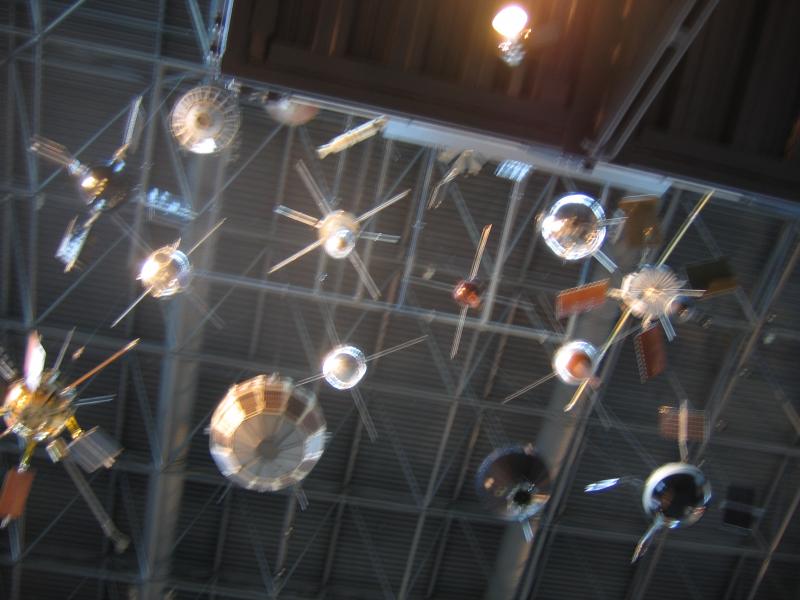Siblings' visit to Jim and Jo's
April 2006 - Part 3 of 5
In the background is the Concord supersonic passinger plane, In the foreground is the American
tilt rotor aircraft, designed to take off and land like a helicopter, and to transition to and from
fast horizontal flight while flying.
This is an early version of a flying wing, whose concept later evolved into our
modern B-2 supersonic stealth bomber.
I was surprised to learn that, during WW 2, the Japanese developed a large submarine, and special
airplanes, that were designed for bombing the US homeland. The submarine would carry the
planes underwater, undetected to the American coastline, and then would launch the aircraft to
attack American cities. Although it was built, and training was underway, it was never used
during the war. This plane, discovered by the Americans during the occupation, was sent to
the Smithsonian, and is the last in existence. It was reported that a tourist from Japan, was very
excited after seeing this plane, and claimed that he was trained as the pilot of these planes!!
Here is the Shuttle ENTERPRISE. It is huge! It is located in the Space and Rocket wing of the Museum.
See, I told you it was HUGE!
This is one of the Shuttle's liquid rocket engines.
 i iAnd here is a fuzzy photo of some early satellites hanging from the ceiling.
Here are two Gemini Capsules that were part of America's early Man in Space program.
Here is the Soviet's famous MIG-15, that was their top performer in the Korean War.
Here is the Navy's "Intruder" - an all weather attack plane with nuclear capability.
It was used effectively in the Vietnam War.
This is the prototype of the new multiservice strike fighter that was won by Lockheed after an
intensive competition with Boeing. I think the first squadrons have been delivered to the USAF.
It is really a great performer that is both very beautiful and expensive!
This is a general view of the main exibition room. It is very well done and they seem to have
lots of room for future expansion and growth. My only complaint is from the photographer's
point of view -- the lighting is quite low, requiring very slow shutter speeds. The energy bill
would be enormous if they were to try and increase the lighting level, but skylights might
be good. There was much, much more that I did not show here, or for that matter that I
did not see. If you like this type of thing, try and go and see it sometime. It is free except
for a moderate parking fee.
On Saturday, it was raining, and we decided to go and see the "Washington National Cathedral"
which is located in the Northwest part of the District of Columbia. It is a massive
Gothic style Episcopal Cathedral that is the 6th largest church in the world. Don't ask me how
that was figured. Congress passed a bill in 1894 that authorized a committee, and the
cornerstone was laid in 1907 with Teddy Roosevelt in attendance. It was finished in 1990, with
President George H.W. Bush attending. It took a long time and a lot of money, but my impression
after touring it, was that no expense was spared in providing the best. It is magnificent.
This is a quick shot of the upper front. Because of the heavy rain we went directly inside.
This is the view from inside the main entrance front doors. Many national events, such as
funeral services, are held here and President Woodrow Wilson is buried here.
Hear is a view looking back towards the main entrance from the middle of the church.
Note the magnificent "Rose Window" above the entrance.
Here we are in the center of the church, looking through the Choir towards the altar.
Here are some of the many beautiful stained glass windows.
This is a special window that depicts some of the planets and stars. I understand that a piece of
Moon Rock brought back by one of the Apollo missions is embedded in the window.
Continued on Part4
|